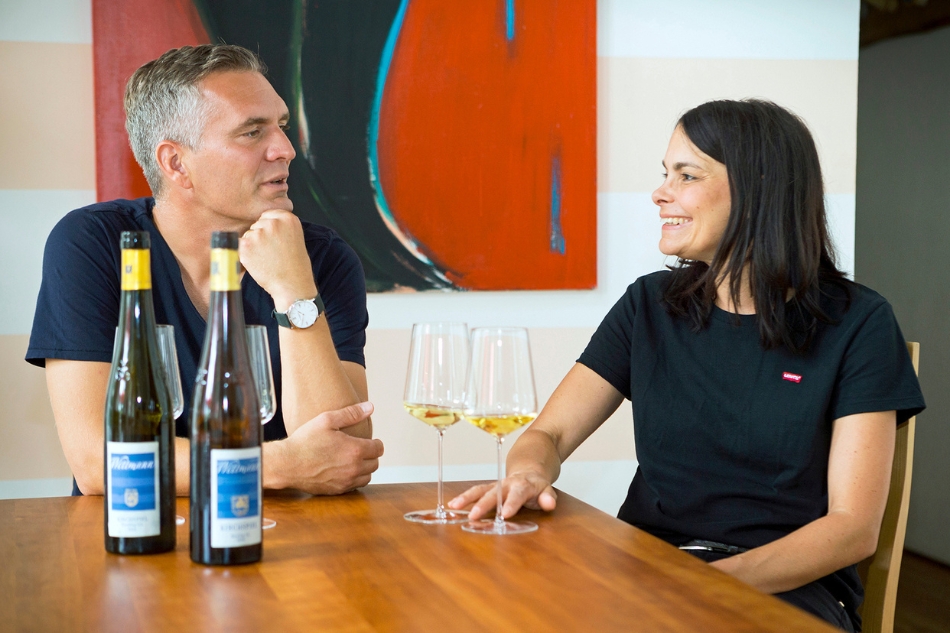
Weingut Wittmann
Philipp Wittmann is one of Germany’s luminary dry wine producers. As the fifteenth-generation winemaker, Philipp knew that he would follow in his father’s footsteps from a young age. By the time he joined the winery in 1990, Weingut Wittmann was one of the very few in Germany to be fully certified organic. From the get-go, Philipp believed firmly in his father’s philosophy around natural viticulture, choosing to build on his work to lead the winery to full biodynamic certification in 2004.
Inspired by the professionalism and self-confidence of the great Bordeaux chateaux and top Italian family wineries in the 1990s, Philipp hit the road as an advocate for the Rheinhessen around the world, especially his beloved Morstein, as part of a cluster of young winemakers who had just taken over their family estates: Philipp Wittmann, Klaus Peter Keller, Carolin Spanier-Gillot and Hans-Oliver Spanier all actively worked together to champion the Rheinhessen’s quality renaissance.
Over time, working more closely in step with their full biodynamic principals and the intense manual labour required to drive soil health and plant vitality, Philipp dialled-in his style, producing bright, cleansing, soil-driven dry wines at the absolute highest level. The Wittmann wines now have “must-have” status for German wine lovers and, recognising his influence in the region, Philipp was for several years President of the VDP Rheinhessen and is now Vice-President of the VDP at a national level (2025).
In keeping with tradition, the Rieslings are fermented naturally and aged slowly, in large, traditional oval casks on the fine lees for as long as possible. This takes place in the same large, cold, vaulted cellar that has housed the Wittmann wines since 1829.
The Wittmann style is one that is pure, austere, and highly stimulating – wines that have energy, power and salinity. A vertical tasting in 2024 proved not only that the best dry wines can age over twenty years but that recent vintages have kicked on a gear in terms of race, chisel and intensity.
The calling card of the estate is the Estate Trocken. A wine that is vinified in the same way as the top wines, only bottled a little earlier, it reflects a clear limestone character that overdelivers on its status. Westhofen 1G Trocken is their ambassador for the village and effectively serves as the second wine of Morstein GG, as typically 90% of the fruit for the Westhofen comes from the Grosse Lage (Grand Cru) classified site, blended with 10% complimentary vineyards (hence the 1G: Premier Cru designation).
The Grosses Gewächs are a rollcall of the best sites in the central Rheinhessen: Aulerde is a clay, limestone and sandy vineyard, south facing, yielding a softer, more yellow-fruited and grapefruit infused Riesling, from vines planted in 1941 and 1951 – the oldest on the estate. Kirchspiel comes from the east-southeast facing part of the vineyard, steeper in gradient (30%) with little topsoil over limestone, producing a noticeably spicy, herbaceous and salty style of wine. Brunnenhauschen is on rocky limestone with clay
topsoil and veins of iron, south exposed but with a higher elevation at 220m. It produces creamier Rieslings on the attack, with white peach, cherry and citrus notes paired with the high acidity of a cool, late ripening site. Morstein is pure limestone, south exposed up to 260m elevation, late ripening, and produces the most mineral, layered and elevated, pure Riesling, from vines planted mostly in the 1970s. Finally, as of 2024, the GG range includes Höllenbrand, which serves as the western continuation of Morstein, on similar soils but cooler, it ripens on average seven days later. It typically produces elegant notes of fine jasmine and green tea with a certain lacy power behind. Wittmann is the majority owner of Morstein with 5ha in total.
Ortswein (village) wines are produced from Gundersheim (limestone, west of Westhofen) and Nierstein (red slate, abutting the Rhine river) as well as an accomplished range of Weissburgunder and Spätburgunder, each a clear, crisp and faithful expression of the variety.
The 2024 Vintage
“2024 was a late-ripening, cooler vintage – the wines are all on the citrus compared to the more yellow-fruited 2023s. Animated acidities and a certain lightness in alcohol means they are on average around 0.5% lower than the previous few years. The brightness of the wines means we could do longer lees contact this year and bottle in the summer. We love 2024 as it is a vintage that in the end had full ripeness with freshness – a dancing acidity – transparent and exciting to taste.” – Philipp Wittmann.
61 St. James's Street, London SW1A 1LZ
Reg. Company No: 68576
AWRS URN: XPAW00000105319
Please do not share with anyone under the legal purchase age for alcohol.
Drink Responsibly www.drinkiq.com
© Justerini & Brooks 2025. All Rights Reserved.